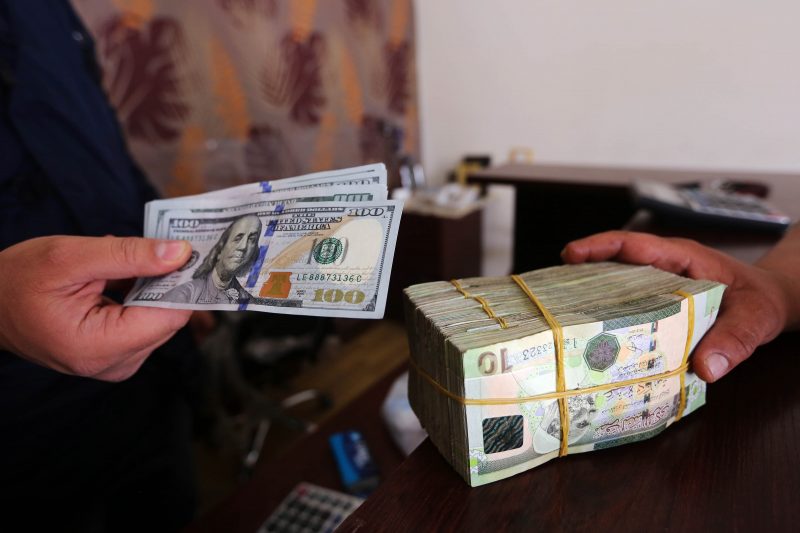Economic warfare plays out as Libyans battle for capital
The Government of National Accord is already using its control of the central bank to weaken the forces of Khalifa Haftar (MAHMUD TURKIA)
Tripoli (AFP) – While rival Libyan forces fight for control of the capital, an economic war is playing out which could have grave and lasting consequences for the oil-rich country.
Hundreds of people have been killed and thousands wounded since the battle for Tripoli erupted on April 4, when commander Khalifa Haftar launched an assault to take the city.
While fighters loyal to the UN-recognised Government of National Accord (GNA) have held Haftar’s fighters at bay in the Tripoli suburbs, both sides have economic weapons to use against their rival.
Haftar is backed by a parallel administration in the east, the stronghold of his self-styled Libyan National Army, while his forces also control the country’s most important oil fields.
But his ability to exploit such resource wealth is limited as the production is managed by the Tripoli-based National Oil Corporation (NOC), while the revenues are chanelled through the central bank in the capital.
“(Haftar) notes that all the oil money goes mostly to the west, that’s what upped the political divisions in Libya since the east is historically considered abandoned by the west,” a European diplomat said on condition of anonymity.
Between 2017 and 2018, the parallel authorities in the east tried to sell oil without passing through Tripoli, but the international community — and in particular Washington — thwarted such efforts.
The United Nations envoy to Libya, Ghassan Salame, said Tuesday there are indications the eastern branch of the NOC is “again attempting to export oil in violation of the sanctions regime”.
“This illegal attempt risks dividing the National Oil Company, which remains the primary source of revenue for the country, and the national social safety net,” he told the UN Security Council.
Jalel Harchaoui, a researcher at the Clingendael Institute in The Hague, said it remains “very probably that the pro-Haftar faction will attempt to sell oil (directly) on the international market”.
Such sales could be “tacitly tolerated by the White House”.
US President Donald Trump spoke to Haftar by phone in mid-April, a move which was widely perceived to indicate his support for the Libyan commander despite Washington not taking an official stance.
Haftar is unlikely to hold up exports, said Harchaoui, as the United States is pushing to maintain global oil output following a drop in exports from Venezuela and Iran.
But if the Trump administration were to publicly confirm its support for the GNA, “the Haftar camp could panic” and block oil exports, according to Harchaoui.
– ‘Catastrophic scenario’ –
The GNA, led by Fayez al-Sarraj, is already using its control of the central bank to weaken Haftar’s forces.
Tripoli oversees civil servant salaries for the entire country and, after Haftar launched his assault on the city, Sarraj vowed to cut payments to those who had joined the LNA.
The central bank went further still at the end of last month, limiting access to capital in its banks in eastern Libya while citing “irregularities” found at the financial institutions in question.
A parallel central bank under the rival eastern administration, meanwhile, criticised the “unequal distribution” of revenues.
It slammed a “regional war targeting the banks of Benghazi”, the main city in eastern Libya.
The administration in the country’s east could struggle to pay its employees and Haftar’s forces if Tripoli’s central bank tightened its measures against them, International Crisis Group said Monday.
“This in turn could prompt Haftar to cut oil exports from areas he controls and ignite an economic war,” the organisation said in its report.
“This would deepen the de facto split between east and west… and possibly become a prelude to partition,” it added.
The likelihood of the country being irreparably split was also raised Tuesday by Salame in New York.
“The violence on the outskirts of Tripoli is just the start of a long and bloody war on the southern shores of the Mediterranean,” he said.
Without immediate action to stop the flow of arms, Salame warned “Libya will descend into civil war which could potentially lead to a Hobbesian all-against-all state of chaos or partition of the country.”
While the UN envoy drew on the immediate violence around the capital, Crisis Group looked to the repercussions if the Tripoli authorities take further economic measures and “let the banking crisis come to a head”.
A “catastrophic scenario” could unfold, said the report, with “grave social, economic and political repercussions for the entire country.”
Disclaimer: Validity of the above story is for 7 Days from original date of publishing. Source: AFP.


